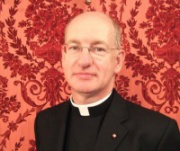Faith leaders join call for equality between physical and mental health treatment

Bishop Moth
The main cause of death for young men under 45 in the UK is suicide. But mental health services continue to be cut back. Today, faith leaders are among more than 200 signatories to an open letter calling for equality between physical and mental health treatment before the government's spending review.
The Archbishop of Canterbury, Justin Welby, Chief Rabbi Ephraim Mervis, Bishop Richard Moth, from the Catholic Bishops Conference, Rev Gareth Powell, Secretary of Conference of the Methodist Church, Archbishop of York John Sentamu has joined Danny Boyle, Sunderland FC manager Sam Allardyce, actors, writers and musicians, to urge the government to help reduce the suffering of those with mental illness by increasing investment in services.
"We accept, and urge ministers to accept, that this will require additional investment in mental health services," the letter states. "But we are strongly persuaded that sustained investment in mental health services will lead to significant returns for the exchequer, by reducing the burden on the NHS through the improved wellbeing of our citizens, by helping people to stay in, or get back into work, and by helping young people succeed in education."
The letter, launched by the Lib Dems' former mental health minister, Norman Lamb, Time to Change ambassador and former Labour government communications director, Campbell, and former Conservative cabinet minister, Andrew Mitchell. highlights 10 major concerns over inadequate mental health care, including the lack of access to treatment, long waiting times, inadequate crisis care, use of police cells and the 20-year gap in life expectancy between those with mental health problems and the rest of the population.
The signatories note comments acknowledging the high cost of mental ill health, including to individuals and their families as well as to the economy as a whole. "Some estimates put this cost as high as £100bn a year, spent on visits to A&E, lost jobs, unemployment benefits, homelessness support, police time, burden on the criminal justice system and prison places," they write. "So the moral and economic argument for a new approach is clear. And so is the human and moral argument."
The letter is the centrepiece of a wider campaign that calls for equality between mental and physical health. In addition to other political figures who have backed the call, among them the prime minister's former advisor Steve Hilton, and nine former Tory and Labour health secretaries, the first signatories include senior figures from business and employment, faith leaders, culture and arts, sport, the military, civil society, education and medicine.
"Mental health is an issue whose time has come," Campbell said. "That we have gathered in a matter of a few days so many voices calling for equality with physical health is the latest sign of that. The cultural depth and political breadth of people making that call cannot be ignored. In addition to making the human case for a new approach I think we can persuade the government of the economic case too. The spending review is the opportunity for the government to show that they understand this.'"
The Bishop for Mental Health from the Roman Catholic Bishops Conference of England and Wales, the Right Reverend Richard Moth said: "The campaign which is being launched today to treat mental health equally with physical health and ensure that those in need receive proper access to treatment and help is extremely important.
"I've become acutely aware just from our work on the Mental Health Project for the Bishops Conference these past few years how prevalent is the need, and how often that need goes unmet.
"On behalf of our Bishops Conference, and together with other churches and faith groups, I'm very glad to be supporting this vital cause, and I urge people to join this campaign for more resources for mental health by contacting their member of parliament."


















